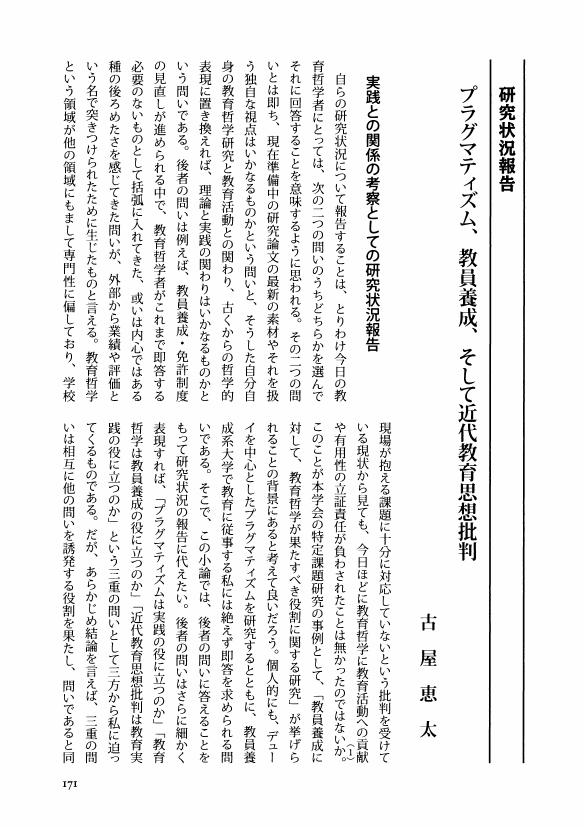2 0 0 0 デューイというモナドが映す有機的統一の思想 : 若きデューイと「個人の時代」を考える(報告論文,デューイというモナドが映す有機的統一の思想-若きデューイと「個人の時代」を考える-,フォーラム2)
- 著者
- 古屋 恵太
- 出版者
- 教育思想史学会
- 雑誌
- 近代教育フォーラム (ISSN:09196560)
- 巻号頁・発行日
- vol.19, pp.57-72, 2010
本論文は、初期デューイのライプニッツ論そのものとそれを育んだヘーゲル主義という近景にまず焦点を合わせる(中心化)。次に、アメリカを離れ、フランスのタルドを、同時代にライプニッツ論を著したという理由だけで視野の外から取り上げて提示する(脱中心化)。ヘーゲル主義の影響が生涯デューイに残り続けたとする近年の研究や、同時代にデューイと同様にライプニッツについて論じたタルドも手掛かりとしながら、若きデューイの有機的統一の思想と個性論を考察することを通して、「個人の時代」(ルノー)と対時してみたい。それは、本論文の方法論的枠組みであるライプニッツの中心化-脱中心化の論理を、タルドと同じく「ライプニッツの子ども」である初期デューイの思想そのものに見出すことでもあるだろう。
2 0 0 0 OA 社会的構成主義におけるヴィゴツキーとデューイ : 「活動」概念の導入は何をもたらすか
- 著者
- 古屋 恵太
- 出版者
- 首都大学東京
- 雑誌
- 人文学報. 教育学 (ISSN:03868729)
- 巻号頁・発行日
- vol.36, pp.63-81, 2001-03-10
1 0 0 0 OA プラグマティズム、教員養成、そして近代教育思想批判
- 著者
- 古屋 恵太
- 出版者
- 教育哲学会
- 雑誌
- 教育哲学研究 (ISSN:03873153)
- 巻号頁・発行日
- vol.2007, no.96, pp.171-177, 2007-11-10 (Released:2009-09-04)
- 参考文献数
- 14
1 0 0 0 OA 後期デューイ存在論における「個性」 (individuality) 概念の考察
- 著者
- 古屋 恵太
- 出版者
- 教育哲学会
- 雑誌
- 教育哲学研究 (ISSN:03873153)
- 巻号頁・発行日
- vol.2000, no.82, pp.65-80, 2000-11-10 (Released:2010-01-22)
- 参考文献数
- 54
This paper inquires into Dewey's conception of individuality in those of his later works which developed an anti-dualistic philosophy, through an examination of his holistic and transactional understanding of situation and context.The study of his conception of situation indicates that individuality means a new mode of cognitive and practical transaction in which an individual, together with things and other individuals, re-emerges through his reflective thinking. This occurs when a syncretic, determinate situation is recovered from an indeterminate situation in which the subject and the object are separate. The present study also shows that individuality represents a phase of context because, according to Dewey, the new mode of interaction turns into another context that will tacitly influence one's reflective thinking in the next indeterminate situation.Thus, the conception of individuality as shown in Dewey's later works does not refer to individual differences as discriminated by a spectator; rather it is a metaphorical representation of a succession of reconstructions in the mode of transaction, which is realized when participants transact among themselves or with things.From the point of view of education, individuality is valuable, not because it brings up autonomous individuals or helps individuals achieve differentiation, but because the emergence of a new meaning as well as a new manner of act is expected to facilitate actual and continuous transactions. Individuality is not an educational goal to be realized through transactions, but rather a mark for the recognition of the establishment of transactions or the new modes of transaction. Thus, individuality has a function of testing the medium of transaction.
1 0 0 0 OA デューイというモナドが映す有機的統一の思想 : 若きデューイと「個人の時代」を考える(報告論文,デューイというモナドが映す有機的統一の思想-若きデューイと「個人の時代」を考える-,フォーラム2)
- 著者
- 古屋 恵太
- 出版者
- 教育思想史学会
- 雑誌
- 近代教育フォーラム (ISSN:09196560)
- 巻号頁・発行日
- vol.19, pp.57-72, 2010-09-19 (Released:2017-08-10)
本論文は、初期デューイのライプニッツ論そのものとそれを育んだヘーゲル主義という近景にまず焦点を合わせる(中心化)。次に、アメリカを離れ、フランスのタルドを、同時代にライプニッツ論を著したという理由だけで視野の外から取り上げて提示する(脱中心化)。ヘーゲル主義の影響が生涯デューイに残り続けたとする近年の研究や、同時代にデューイと同様にライプニッツについて論じたタルドも手掛かりとしながら、若きデューイの有機的統一の思想と個性論を考察することを通して、「個人の時代」(ルノー)と対時してみたい。それは、本論文の方法論的枠組みであるライプニッツの中心化-脱中心化の論理を、タルドと同じく「ライプニッツの子ども」である初期デューイの思想そのものに見出すことでもあるだろう。
1 0 0 0 OA 大恐慌期におけるジョン・デューイの「集合的」(collective)なものに関する考察
- 著者
- 古屋 恵太
- 出版者
- 一般社団法人日本教育学会
- 雑誌
- 教育學研究 (ISSN:03873161)
- 巻号頁・発行日
- vol.80, no.1, pp.13-25, 2013-03-31
近年、大恐慌期以前のデューイの思想に、現代における「集合的知性」論のルーツを求める動きが見られる。本稿が目的とするのは、集産主義の時代、すなわち、1930年代のデューイの政治的著作を中心的に取り上げることで、この時代にこそ明言されたデューイの「集合的知性」の特性を導出することである。本稿では、デューイが政策や制度としての集産主義を、「集合的」なものを哲学的に思考する砥石とし、科学的探求者の協働や、人間の協働の具現化たる人工物に「集合的知性」を見出したことが論じられる。


